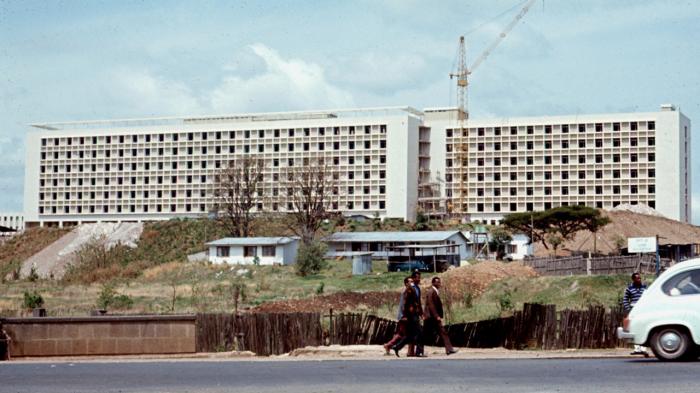WHO teams up with Black Lion Hospital to improve cancer treatment capacity outside Addis Ababa
Cancer is an increasing public health burden for Ethiopia and Sub-Saharan Africa at large. Indeed, by the year 2030, cancer and other non-communicable diseases may overtake some infectious diseases as leading causes of death in the African Region. Currently cancer accounts for four per cent of all deaths in Ethiopia. Many of these deaths can be avoided if the cancer can be detected and treated early. Many cancers can also be prevented by avoiding exposure to common risk factors, such as tobacco smoke. However, many African countries have limited capacity to detect, treat and care for their cancer patients. Clinical oncology infrastructure and improved cancer health systems, as well as prevention and control strategies are essential to curbing this growing epidemic.
A delegation led by the WHO Representative to Ethiopia visited the Oncology Department of Black Lion Hospital in Addis Ababa, on 29 August 2014, to identify opportunities for collaboration. Dr Mathewos Assefa, Head of the Oncology Department, briefed WHO on the daily activities of the department and the major challenges that it is facing. After the briefing, the WHO delegation visited the Inpatient Department (IPD), the Outpatient Department (OPD), the Daycare Clinic, the Radiotherapy Unit and the Registry.
Approximately 60,000 new cases of cancer are diagnosed annually in Ethiopia. Currently, there are only three oncologists working at the Oncology Department. Ten to 15 new patients are seen every day at the department with inpatient capacity of 16 beds. Many travel from far distances across Ethiopia for their treatment as well as for their follow-up appointments every three months to monitor recurrence. Dr Mathewos said that the lack of capacity of health facilities outside Addis Ababa has resulted in an enormous load of patients gravitating towards Black Lion Hospital from the rest of the country. In fact, more than two-thirds of the patients are coming from outside the capital putting enormous pressure on the Oncology Department of Black Lion Hospital, which has insufficient human or financial resources to respond to the demand. Moreover, although many cancer patients suffer from depression, very little attention is given to this due to the lack of trained health professionals.
Dr Pierre M’Pele-Kilebou, WHO Representative to Ethiopia, said that WHO is ready to support the Oncology Department of Black Lion Hospital to overcome some of the challenges. WHO will support the scaling-up of training in the teaching universities of Hawassa, Mekelle, Jimma, Gondar and Haramaya to build decentralized capacity in the domain of oncology, including supportive supervision from the central level (Black Lion Hospital) to the regions. The Cancer Registry Unit of the hospital will be also supported by WHO to develop its operations, thus attaining a high degree of completeness and quality of data. Moreover, WHO will provide health professionals from the Palliative Care Unit of Black Lion Hospital with training on depression as part of the WHO Mental Health Gap Action Programme (mhGAP).
http://www.afro.who.int/
Cancer is an increasing public health burden for Ethiopia and Sub-Saharan Africa at large. Indeed, by the year 2030, cancer and other non-communicable diseases may overtake some infectious diseases as leading causes of death in the African Region. Currently cancer accounts for four per cent of all deaths in Ethiopia. Many of these deaths can be avoided if the cancer can be detected and treated early. Many cancers can also be prevented by avoiding exposure to common risk factors, such as tobacco smoke. However, many African countries have limited capacity to detect, treat and care for their cancer patients. Clinical oncology infrastructure and improved cancer health systems, as well as prevention and control strategies are essential to curbing this growing epidemic.
A delegation led by the WHO Representative to Ethiopia visited the Oncology Department of Black Lion Hospital in Addis Ababa, on 29 August 2014, to identify opportunities for collaboration. Dr Mathewos Assefa, Head of the Oncology Department, briefed WHO on the daily activities of the department and the major challenges that it is facing. After the briefing, the WHO delegation visited the Inpatient Department (IPD), the Outpatient Department (OPD), the Daycare Clinic, the Radiotherapy Unit and the Registry.
Approximately 60,000 new cases of cancer are diagnosed annually in Ethiopia. Currently, there are only three oncologists working at the Oncology Department. Ten to 15 new patients are seen every day at the department with inpatient capacity of 16 beds. Many travel from far distances across Ethiopia for their treatment as well as for their follow-up appointments every three months to monitor recurrence. Dr Mathewos said that the lack of capacity of health facilities outside Addis Ababa has resulted in an enormous load of patients gravitating towards Black Lion Hospital from the rest of the country. In fact, more than two-thirds of the patients are coming from outside the capital putting enormous pressure on the Oncology Department of Black Lion Hospital, which has insufficient human or financial resources to respond to the demand. Moreover, although many cancer patients suffer from depression, very little attention is given to this due to the lack of trained health professionals.
Dr Pierre M’Pele-Kilebou, WHO Representative to Ethiopia, said that WHO is ready to support the Oncology Department of Black Lion Hospital to overcome some of the challenges. WHO will support the scaling-up of training in the teaching universities of Hawassa, Mekelle, Jimma, Gondar and Haramaya to build decentralized capacity in the domain of oncology, including supportive supervision from the central level (Black Lion Hospital) to the regions. The Cancer Registry Unit of the hospital will be also supported by WHO to develop its operations, thus attaining a high degree of completeness and quality of data. Moreover, WHO will provide health professionals from the Palliative Care Unit of Black Lion Hospital with training on depression as part of the WHO Mental Health Gap Action Programme (mhGAP).
http://www.afro.who.int/


No comments:
Post a Comment